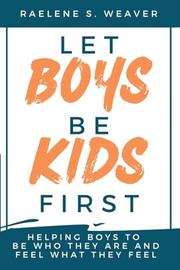PRO CONNECT
CREATIVESHOT PHOTOGRAPHY
Raelene S. Weaver is a retired licensed Marriage and Family Therapist, who also holds a K-12 Teaching Credential. She has worked with special ed kids in classroom settings, and in private practice with teenage boys through the Santa Clara County Probation Department in San Jose, CA.
She is a TEDx speaker and published author of Let Boys Be Kids First.
Prior to becoming a therapist, Raelene worked as a Development Officer for United Way. She managed the campaign for 22 State agencies, increasing Campaign goals by 10% each year for three years.
While at Pacific Gas & Electric Company, she worked in Community Relations to help promote PG&E's small business development incubation program, and led the company’s Spare the Air Campaign.
She managed the Commute Alternatives Program at Lawrence Berkeley Laboratory, promoting carpools and clean air initiatives.
She served as priority specialist for San Francisco Junior League, focusing on women and depression and breast cancer research.
Raelene is founder of the Silicon Valley Men's Center website and Facebook Group, a hub for boys and men on all issues related to healthy relationships and mental and emotional health. Her work is endorsed by Division 51-Men's Issues-by the American Psychological Association.
“Her prose is evocative and down-to-earth in its depiction of the everyday psychic wounds of boyhood and the possibilities of soothing them. (“Instead of brushing off the event or simply flushing the fish down the toilet, he sat with his son and let him cry,” she writes of a dad helping his child cope with a goldfish’s death.)”
– Kirkus Reviews

Boys and men are languishing under a code of toxic masculinity that requires them to suppress emotions and deny their humanity, according to this searching psychological study.
Weaver, a retired marriage and family therapist, argues that boys have as much emotional capacity and neediness as girls, but are held to cultural norms—injunctions like “don’t be a sissy” and “boys don’t cry”—that discourage them from discussing their feelings. In extreme cases, she warns, they may develop “alexithymia,” a disorder that renders them “emotionally numb or devoid of feelings.” As a result, she contends, boys are beset by anxiety, anger, and depression; are twice as likely as girls to be expelled from school; and have higher rates of alcoholism, drug abuse, violent crimes, and suicide. Drawing on her experiences counseling teen sex offenders, Weaver elaborates on Norbert Ralph’s “prosocial model,” which helps boys understand and regulate emotions to head off bad decisions. She calls for an overhaul of social expectations for boys and men, one that will license them to cry freely and talk about their sadness, body-image issues, and sexual insecurities. The author suggests interventions to help boys open up about their feelings, from the Let Me Run running club that encourages friendly camaraderie to schoolyard “buddy benches” that gloomy young people can sit on to signal classmates to come and comfort them. Pitched at parents and teachers, Weaver’s treatise combines insightful dives into social psychology with self-analysis questions—“Do you find yourself giving more hugs and affection to your daughters than your sons?”—to get readers thinking. Her prose is evocative and down-to-earth in its depiction of the everyday psychic wounds of boyhood and the possibilities of soothing them. (“Instead of brushing off the event or simply flushing the fish down the toilet, he sat with his son and let him cry,” she writes of a dad helping his child cope with a goldfish’s death.) Traditionalists may bridle at Weaver’s vision of what manhood should look like. Among the nontoxic male role models she extolls is the South Korean pop group BTS, for its “neutral gender of masculinity” and “pastel hair colors.” Still, many boys and men will find her case for a more expressive, communicative, empathetic life to be compelling.
An illuminating, warmly sympathetic brief for replacing stoic, hard-bitten manliness with richly expressed feelings.
Pub Date: March 29, 2023
ISBN: 9798987961704
Page count: 165pp
Publisher: Self
Review Posted Online: Jan. 16, 2024
Kirkus Reviews Issue: March 1, 2024
© Copyright 2024 Kirkus Media LLC. All Rights Reserved.
Hey there, book lover.
We’re glad you found a book that interests you!
We can’t wait for you to join Kirkus!
It’s free and takes less than 10 seconds!
Already have an account? Log in.
OR
Trouble signing in? Retrieve credentials.
Welcome Back!
OR
Trouble signing in? Retrieve credentials.
Don’t fret. We’ll find you.

